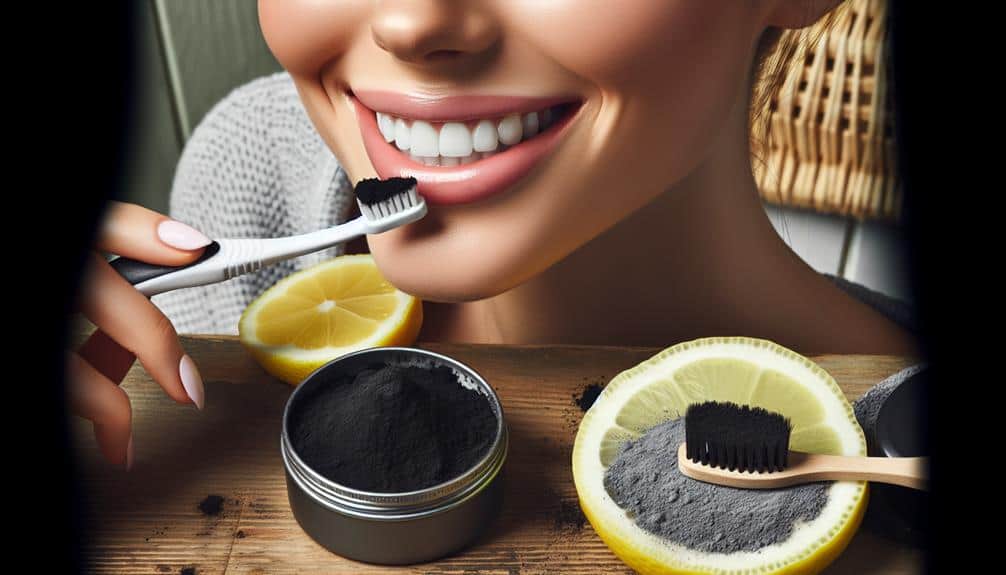Achieve a brighter smile with these 5 simple DIY charcoal teeth whitening methods. Start by using activated charcoal powder from a reliable source to bind to surface stains on your teeth. Mix charcoal with coconut oil for a powerful paste that not only whitens but also has antibacterial properties. Blend charcoal with baking soda for an effective scrub that removes toxins and promotes oral hygiene. Try a rinse of charcoal with lemon juice for a revitalizing whitening alternative. Finally, consider making your charcoal toothpaste for impurity removal and fresher breath. These methods can enhance your oral care routine naturally and effectively.
Key Points
- Utilize activated charcoal powder to bind surface stains for effective teeth whitening.
- Combine charcoal with coconut oil for an antibacterial paste that moisturizes gums.
- Blend charcoal with baking soda to create a scrub that removes toxins and promotes oral hygiene.
- Try a charcoal and lemon juice rinse for a whitening alternative with antibacterial properties.
- Create a homemade charcoal toothpaste to absorb impurities, remove stains, and freshen breath.
Activated Charcoal Powder
To effectively utilize activated charcoal powder for teeth whitening, commence by guaranteeing you have a high-quality product sourced from a reputable supplier. This ensures that you're using a safe and effective product for your oral health regimen.
Activated charcoal powder works by binding to surface stains on the teeth, helping to remove them and brighten your smile over time. When using activated charcoal powder, consider complementing your routine with a charcoal toothbrush for added benefits. Charcoal toothbrushes are designed to help with stain removal and plaque control, providing a thorough clean for your teeth and gums.
Additionally, incorporating a charcoal mouthwash into your routine can further enhance the effects of activated charcoal powder. Charcoal mouthwashes are known for their ability to freshen breath, fight bad bacteria in the mouth, and contribute to a cleaner, healthier oral environment.
Charcoal and Coconut Oil Paste
For enhanced whitening benefits, consider blending activated charcoal powder with coconut oil to create a potent paste. When using this charcoal and coconut oil paste for teeth whitening, it's crucial to understand the benefits of coconut oil and the proper brushing techniques to maximize its effectiveness:
- Coconut Oil Benefits:
- Coconut oil has antibacterial properties that can help reduce harmful bacteria in the mouth, promoting better oral health.
- The lauric acid found in coconut oil has been shown to help reduce inflammation and fight against plaque buildup.
- Using coconut oil in the paste can also help moisturize the gums and prevent dryness or irritation during the whitening process.
- Brushing Techniques:
- Apply the paste to your toothbrush and brush gently in small, circular motions for about 2 minutes.
- Ensure all teeth are covered with the paste to allow the charcoal and coconut oil to work effectively.
- Rinse your mouth thoroughly after brushing to remove any residue and reveal a brighter smile.
Charcoal and Baking Soda Scrub
Blend activated charcoal with baking soda to create a powerful scrub for teeth whitening and stain removal. This scrub combines the benefits of activated charcoal and baking soda to enhance your oral hygiene routine.
Activated charcoal is known for its ability to absorb toxins and stains, making it a popular ingredient in teeth whitening products. When combined with baking soda, which is mildly abrasive, the scrub can effectively remove surface stains from your teeth.
Charcoal has natural whitening properties that help brighten your smile while promoting good oral hygiene. Baking soda, on the other hand, can help neutralize acids in the mouth and eliminate bacteria that cause plaque. Together, they form a potent combination for maintaining oral health and achieving a whiter smile.
To use this scrub, simply mix a small amount of activated charcoal with baking soda until you achieve a paste-like consistency. Gently brush your teeth with the mixture for about two minutes, then rinse thoroughly. Incorporate this scrub into your oral care routine a few times a week for best results.
Charcoal and Lemon Juice Rinse
Consider incorporating a charcoal and lemon juice rinse into your oral care routine for a revitalizing alternative to promote teeth whitening and fresh breath. This DIY method can provide a gentle yet effective way to brighten your smile while also benefiting from the antibacterial properties of lemon juice.
- Lemon Juice Benefits: Lemon juice contains citric acid, which may help whiten teeth by breaking down stains on the enamel. It also has natural antibacterial properties that can help combat harmful bacteria in the mouth.
- Lemon Juice Risks: While lemon juice can be effective in teeth whitening, its high acidity can erode tooth enamel over time. It's essential to use this rinse sparingly and rinse your mouth thoroughly after use.
- Charcoal Mouthwash Effectiveness: Activated charcoal is known for its ability to absorb toxins and stains, making it a popular ingredient in oral care products. When combined with lemon juice, it can provide a rejuvenating rinse that may help remove surface stains from the teeth.
Charcoal Toothpaste Recipe
To make a charcoal toothpaste at home, you can mix activated charcoal powder with natural ingredients for an invigorating and teeth-whitening oral care product. Activated charcoal is known for its ability to absorb impurities and stains from the teeth, making it a popular choice in natural teeth whitening remedies. When creating charcoal toothpaste, consider incorporating ingredients like coconut oil, baking soda, and peppermint essential oil for their additional oral health benefits and revitalizing taste.
Charcoal toothpaste offers benefits similar to charcoal mouthwash, such as removing surface stains, freshening breath, and promoting overall oral hygiene. The gritty texture of charcoal helps to scrub away plaque and tartar, while its natural properties aid in balancing the pH levels in the mouth.
When used in conjunction with a charcoal toothbrush, which is known for its effectiveness in removing plaque and bacteria, charcoal toothpaste can enhance your oral care routine and contribute to a brighter smile. Remember to use these products in moderation to avoid excessive abrasion on the teeth and consult your dentist if you have any concerns about incorporating charcoal into your oral care regimen.
Frequently Asked Questions
Are There Any Potential Side Effects of Using Charcoal Teeth Whitening Methods?
When using charcoal teeth whitening methods, consider potential risks like enamel damage or gum irritation. Precautions include not using it too frequently. Long term effects could include weakened enamel, so consult a dentist for concerns.
Can Charcoal Teeth Whitening Methods Be Used by Individuals With Sensitive Teeth or Gums?
For individuals with sensitive teeth or gums, explore alternative solutions to charcoal teeth whitening methods. Safe practices include consulting with a dentist for personalized recommendations. Prioritize oral health and consider gentler whitening options.
How Frequently Should Charcoal Teeth Whitening Methods Be Used to See Noticeable Results?
For best results, use charcoal teeth whitening methods 2-3 times a week. Typically, noticeable improvements can be seen within 2-4 weeks of consistent use. Remember to follow recommended guidelines to avoid any potential issues.
Are There Any Specific Types or Brands of Activated Charcoal Powder That Are Recommended for Teeth Whitening?
Avoid getting lost in the charcoal jungle! When selecting activated charcoal for teeth whitening, stick to reputable brands like Active Wow or FineVine. Remember, safety first! Follow proper application techniques for dazzling results.
Can Charcoal Teeth Whitening Methods Be Used in Conjunction With Traditional Teeth Whitening Products or Treatments?
You can combine charcoal toothpaste or DIY remedies with traditional whitening strips or professional treatments for enhanced results. However, consult your dentist to guarantee compatibility and prevent any adverse effects on your oral health.


